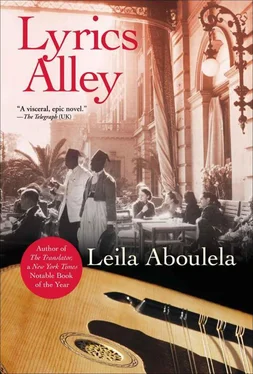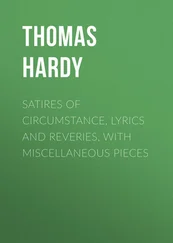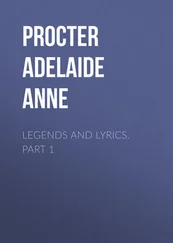Leila Aboulela - Lyrics Alley
Здесь есть возможность читать онлайн «Leila Aboulela - Lyrics Alley» весь текст электронной книги совершенно бесплатно (целиком полную версию без сокращений). В некоторых случаях можно слушать аудио, скачать через торрент в формате fb2 и присутствует краткое содержание. Год выпуска: 2011, Издательство: Grove Press, Жанр: Современная проза, на английском языке. Описание произведения, (предисловие) а так же отзывы посетителей доступны на портале библиотеки ЛибКат.
- Название:Lyrics Alley
- Автор:
- Издательство:Grove Press
- Жанр:
- Год:2011
- ISBN:нет данных
- Рейтинг книги:5 / 5. Голосов: 1
-
Избранное:Добавить в избранное
- Отзывы:
-
Ваша оценка:
- 100
- 1
- 2
- 3
- 4
- 5
Lyrics Alley: краткое содержание, описание и аннотация
Предлагаем к чтению аннотацию, описание, краткое содержание или предисловие (зависит от того, что написал сам автор книги «Lyrics Alley»). Если вы не нашли необходимую информацию о книге — напишите в комментариях, мы постараемся отыскать её.
Lyrics Alley — читать онлайн бесплатно полную книгу (весь текст) целиком
Ниже представлен текст книги, разбитый по страницам. Система сохранения места последней прочитанной страницы, позволяет с удобством читать онлайн бесплатно книгу «Lyrics Alley», без необходимости каждый раз заново искать на чём Вы остановились. Поставьте закладку, и сможете в любой момент перейти на страницу, на которой закончили чтение.
Интервал:
Закладка:
Nabilah delighted in these comments and considered them part of the amusement and banter of Cairo street life. She would answer back, too, saying, ‘It’s my fate and my portion’ or ‘My daughter is pretty, you can’t fault her . Thank God, she has smooth hair.’
But deep down, she was troubled about her children. They were like centaurs, neither fully Egyptian nor fully Sudanese, awkward, clumsy, serious and destined to never fit in.
‘I want to go home to Father,’ said Ferial one day, and packed a little bag.
She succeeded in making her way, undetected, down outside the building and as far as the bottom of the road. Nabilah spanked her and warned her that if she went back to Umdurman, Hajjah Waheeba would grab her and cut her again with a knife. Ferial became hysterical and throughout the next week had nightmares.
‘I want to play in a garden,’ she whispered to her mother, ‘like the garden of the saraya back home.’
‘I will take you to the zoo,’ Nabilah said. ‘The zoo here is much better and bigger than the one in Khartoum.’
Everything in Cairo was much better and bigger than its counterpart in Khartoum. They must learn to look, these two children. They must understand all the backwardness they were rescued from and appreciate their better life; they must fit in and become normal like other Egyptian children. Their names were not helpful, Nabilah had to admit. The King her son was named after was now deposed and Princess Ferial was out of the country. This was a new Cairo, a new era. Nabilah thrived and wanted her children to thrive, too. Change was in the air, the old order of Pashas and Beys was waning and this suited Nabilah fine. She, too, was an ordinary middle-class woman who no longer wanted her husband Bey.
‘This situation cannot continue, my dear,’ her mother warned her. ‘It is one of three things; either you will make peace with your husband and go back to him, or Mahmoud Bey will stop sending you the allowance or, God forbid, he will divorce you and take the children.’
Sometimes, when Farouk and Ferial exasperated Nabilah, the thought of sending them to live with their father did seem appealing. But she would immediately chide herself. It would be morally wrong to give them up to such chaos. Who would supervise their upbringing in Umdurman? The servants? Hajjah Waheeba? And what calibre of adults would that produce (look at Nassir)? Certainly, Mahmoud had no time or inclination to look after children. And he was a reasonable man. He would want the best for his children, and the best for Farouk and Ferial was to be with their mother.
‘There was a time — actually many times — when your relationship with Mahmoud Bey was warm and strong,’ her mother would remind her from time to time. ‘Your early years in Cairo, the months you spent in London. Don’t let Waheeba sour what was good between you. Don’t let her win. Don’t leave everything to her and walk away.’
But Qadriyyah’s voice was losing its edge. Widowed mother, divorced daughter. They were on an equal footing, now, and Nabilah noticed the changes in her mother; the softer voice, the heavier tread, and a sense of retirement, a drawing back. Qadriyyah resumed dyeing her hair and manicuring her nails; she still made sure that her shoes were polished and would not go out in a crumpled skirt, but she did not shrug her daughter off as she used to. She enjoyed having Nabilah and the children around her. Indeed, she needed Nabilah, and all these speeches urging her to return to Sudan were increasingly becoming earnest but conventional politeness, words she did not really mean.
‘Do you want to live your life without a man? Will you be happy alone?’
‘I am happy with you, Mama,’ Nabilah would reply. ‘I am content like this.’
She was making up for the years of separation and even before that. For her hurt when her father died and Qadriyyah remarried, for her feelings of being shunted aside for the sake of her stepfather. She revelled in her mother’s undivided attention; needed this healing time.
Sometimes, when she couldn’t sleep, she would sit at her sewing machine, absorbed and content, her feet pushing the pedal until her mother, at dawn, brought her a cup of tea or it was time to rouse the children for school. Sometimes she dreamt of Mahmoud, or a man who looked like Mahmoud, but might not be him after all. She remembered his passion for the girl he saw in the window of the photographer’s studio; how he had searched and found her. She remembered their time in London and how their every activity and encounter pulsed with harmony. She had loved the father desperate for a cure for his son, had loved his gallantry and determination. She recalled walking arm in arm with him to the hospital, conscious of the new hat on her head — a London affectation. Recalled meals they had shared, the entrance to the Ritz, the afternoon they were introduced to the Duke of Bedford. Perfect days, unclouded by Waheeba or Umdurman. Even seeing Nur in that English hospital was not as distressing as seeing him lying propped up in the hoash. He belonged in that English hospital, and he should have stayed there for the full rehabilitation programme, for as long as it took to get him to be as independent as he could. That would have been the modern thing to do; the right decision. But Mahmoud, so enlightened, so forward-thinking, had surprised her by saying no.
‘I cannot leave him here by himself,’ he had said, ‘and I cannot be away from Sudan for so long. So he must return to Umdurman with me. The whole family must surround him and stand by him.’
She remembered how secretly relieved she had been — and still was — that Fate had struck Waheeba’s son and not Farouk, how utterly grateful. Time and time again, she thanked Allah Almighty. It was the first and only religious sentiment in her life; that deep gratitude saying alhamdullilah and meaning it. No, she did not want to go back to Umdurman and see that miserable sight again. In Nabilah’s mind, religious observance was associated with the rural lower classes; only the poor and uneducated prayed. Her gratitude, though, had an element of worship to it, a step that extended beyond temporary relief and fleeting elation.
The tall, dusky lady standing at the door was difficult to place. Nabilah was distracted by the elegant, obviously expensive, clothes and, instead of searching the stranger’s face, her eyes lingered on the silk of the dress, the collar that folded wide almost over the breasts; such exquisite jewelry, such stylish shoes.
‘Nabilah, how are you?’
That accent, and the words drawled out, her name bald without Aunty or Abla or Hanim.
‘Why Soraya, it’s you!’ French perfume as Soraya leaned slightly to kiss her. ‘I had no idea you were in Cairo. Come in, come in!’
‘I am on my honeymoon,’ Soraya explained matter-of-factly, as if a honeymoon was neither breathless nor transforming.
She followed Nabilah into the sitting room, looking around with curiosity. Manners were never her strongest point, nor posture. She slumped on a chair, on her lap the boxes she’d been carrying, large parcels wrapped in gift paper.
‘I couldn’t be in Cairo without seeing my cousins Farouk and Ferial. It’s been so long.’
Nabilah still couldn’t get over the clothes. They had to be part of the trousseau. Such exquisite taste, and a perfect fit. She could not help but voice her admiration and ask.
‘Oh we missed you,’ cried Soraya, ‘when my sisters and I were getting everything ready. I wished you were in Umdurman so you could have helped me. Instead I had to resort to all our Egyptian and European friends in Khartoum. Here, let me show you a photograph of my wedding.’ She was almost the schoolgirl again, peering into her handbag. ‘I wore a white dress on one of the evenings, the first girl in the family to do so, maybe even the first girl in Umdurman! Both of my sisters only wore Sudanese traditional clothes and the gold. I did all that, too, but I also added on the European evening and we followed the Egyptian custom of giving every guest a little goblet full of sugared almonds as they were leaving. Everyone liked that so much. I’ve always wanted to have a white wedding, ever since I was a little girl and attended yours in Cairo.’
Читать дальшеИнтервал:
Закладка:
Похожие книги на «Lyrics Alley»
Представляем Вашему вниманию похожие книги на «Lyrics Alley» списком для выбора. Мы отобрали схожую по названию и смыслу литературу в надежде предоставить читателям больше вариантов отыскать новые, интересные, ещё непрочитанные произведения.
Обсуждение, отзывы о книге «Lyrics Alley» и просто собственные мнения читателей. Оставьте ваши комментарии, напишите, что Вы думаете о произведении, его смысле или главных героях. Укажите что конкретно понравилось, а что нет, и почему Вы так считаете.











